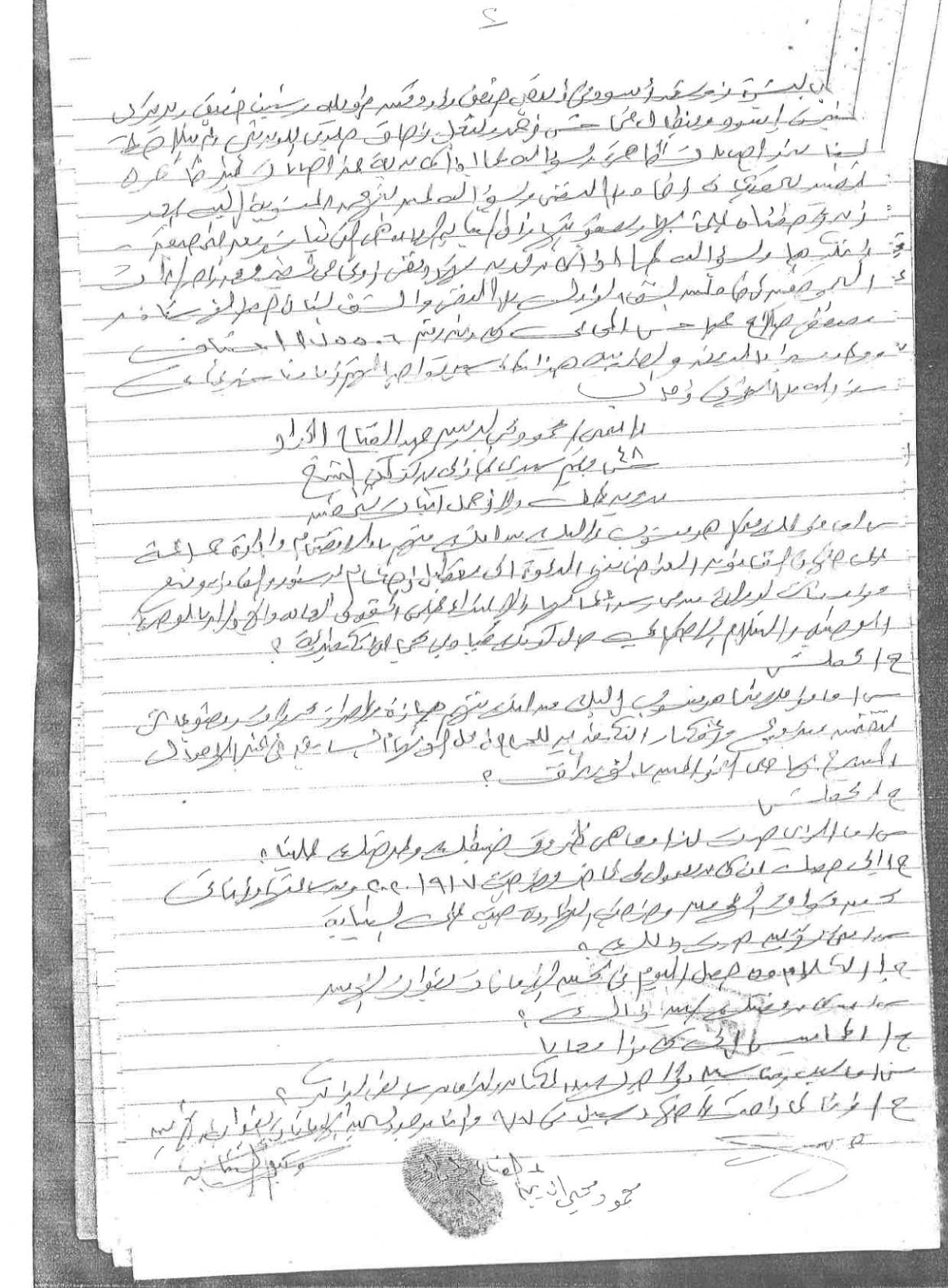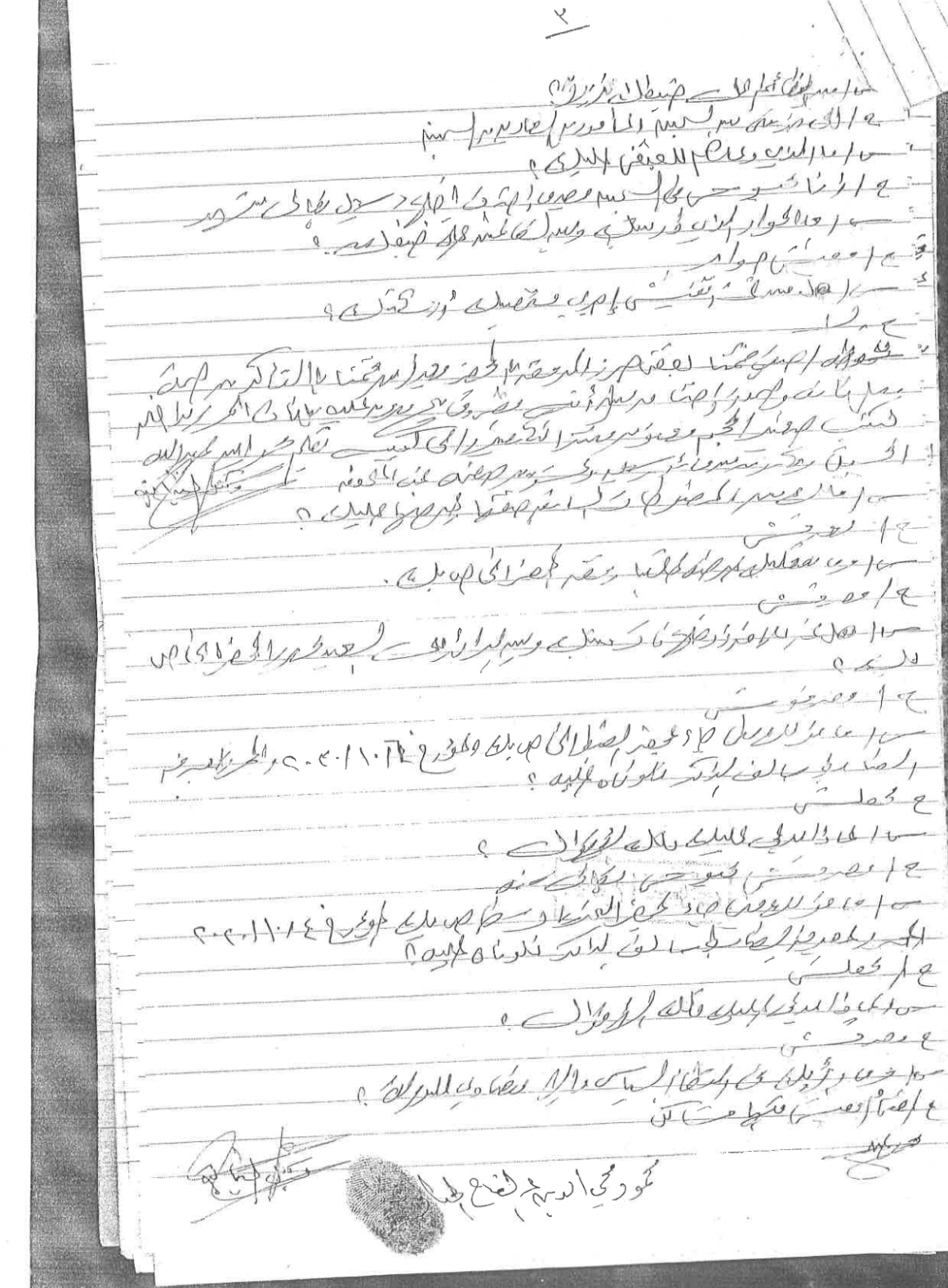

Rasha Mohye El-Din is a teacher in her thirties who lives in the city of Kafr El-Sheikh in the extreme northern corner of Egypt. On the morning of October 7, 2020, she received a phone call from a lawyer informing her that her brother had reappeared after thirty days during which he had vanished as is commonly referred to in Egypt as “enforced disappearance” , and that he had appeared before the Public Prosecution for a new legal case against him. Rasha rushed to the Public Prosecution office, found her brother, patted him on the shoulder and told him, “Don’t worry! God willing, the Lord is on our side.”
In the meantime, the prosecutor summoned Mahmoud to the investigation room while Rasha waited. The lawyer came out and told her that this time the case involved “seized items” in the form of a booklet entitled: The “Fitna of Takfir Wa Al Hukm” meaning Apostatizing and Governance. He added that whoever gave him the booklet did not read the pages that focus on apostatizing the ruler. Rasha quoted the lawyer saying that he told her that “the title of the booklet has nothing to do with the content.”
Mahmoud Mohye El-Din, , a retired military officer has been promoted to the rank of colonel quickly after undergoing training in the United States and China. He retired from his military service in 2010, and despite being asked to reverse his decision twice, he had no judicial precedents and was not summoned by any military authority before his series of detentions started in 2019, according to his sister.
Rasha went on to explain that this was his supposed fourth re-arrest, as Mahmoud faced similar accusations when he was first detained after socialising with “six people, one of whom was a friend. He was among a group socialising where they all expressed their opinions on public affairs and later they were arrested for four months as one of them recorded the session and reported them to the security department. The man in question was arrested too, but for only four days.”
Forty-nine-year-old Mahmoud spent more than two and a half years behind bars on four charges, including joining a “takfiri” or apostatizing group. He received a release order from Kafr El-Sheikh Criminal Court, but this did not guarantee his freedom. Moreover, a fifth charge of joining ISIS was added, and this complicated his release. The director of the Judicial and Legislative Reform Project at the Egyptian Commission for Rights and Freedoms Mohammad Obeid, considered this a clear denial of justice.
After the decision to release Mahmoud was issued, police forces came to his prison cell and transferred him to the security forces camp in the city, where he was detained. After several weeks, the security forces returned him to the Public Prosecution office where he was charged again, and his case was given a new reference number. Meanwhile, Mahmoud’s family and his defence team were unable to communicate with him to know where he was detained.
After the issue of the second release, Rasha went to the police station, finished the administrative procedures and waited for Mahmoud to emerge. Later she was asked to leave and return the next day, but that same evening the National Security moved him to another location. Rasha says that this recurred in the third and fourth cases.
For Sound recording translation please Click Here.
Mahmoud Mohye El-Din is one of 1764 Egyptians, who have been detained and whom the authorities have refused to release despite the release orders obtained by some and the innocence of many of those detainees between 2018 and 2021. In this investigation, we focus on five stories that reveal the Public Prosecution office and its special branch, the State Security Prosecution department, sought to secure a conviction instead of seeking to reveal the truth. This has come to be known as “rotating prisoners” or “Recycled Detention Orders” issued by the state security apparatus and is in violation of the constitution and the law.
The five cases show that the security department follows two main patterns of procedural legalization in the act of “rotating prisoners” or the issuing of “recycled detention orders”. The first method is to hide the person for a while after their release from previous cases and then issuing a new arrest order with a new date, as though the arrestee had already been actually released and then arrested again.
The second method entails charging the person with holding meetings and forming organizations with other detainees and communicating with parties outside the state from inside his prison cell, to commit a terrorist crime.
Examining the documents of the five cases reveals a discrepancy between the actual detention dates and those recorded by the police and the National Security. For example, Mahmoud was detained on October 7, 2019, while the police report shows a different detention date of November 20. This pattern is repeated in the other cases. Additionally, the testimonials of detainees and lawyers assert that the details of those detentions records fail to show how this was implemented on the ground.
Amnesty International has accused the representatives of the state security prosecution of “systematically failing to tackle the falsification of arrest dates by the police, especially by the National Security.”



















































































































































































Source: Transparency Centre for Research, Documentation and Data Management
Mahmoud’s case is one of five documented in this investigation through the testimonies of the families of three detainees and the testimonies of two of those who were released. They were all accused of joining and forming a terrorist group inside or outside prison and of seeking to destabilize the state. When they were sent back to prison, the same charges were used. The documented cases show that many of these accusations were manufactured and were not related to specific incidents, and the charges were not related to any specific acts.

The cases
For Sound recording translation please Click Here.

Al-Taweet did not attempt to verify Mahmoud’s answers about having been forcibly disappeared for forty-five days, and had his statement recorded and submitted to his superior Mutaz Al-Awadi, head of the Public Prosecution office, to take the necessary action. Al-Awadi did not take notice of Mahmoud’s statement and has decided to imprison him for fifteen days renewable, and returned the file to Al-Taweet to complete the investigation.
Minutes later, a new case file was opened that showed only Al-Taweet’s decision to summon the case officer Captain Ahmad Ali to the next investigation session.
According to Ahmad Mufreh, the executive director of the Committee for Justice, the actual role of the Public Prosecutor is to cross examine the acts that have been reportedly perpetrated by the accused, and should not have merely relied on the investigation reports.

The status of the Public Prosecutor in Egypt and his competencies is unmatched worldwide, as Egypt’s ranking in integrity, purity and independence of its judiciary ranks among the top ten countries in the world. Moreover, Egypt has pioneered the setting of judicial values and traditions.
Excerpts from the Egyptian Public Prosecutor Hamada El-Sawy from a oath swearing in speech ceremony for new assistant prosecutors graduates held in January/December 2021.

The minutes of the next interrogation sessions of Mahmoud show that the security officer Captain Ahmad Ali failed to turn up, so Al-Taweet urged him to attend time and again. But Mufreh claimed that “Captain Ali does not take the summons seriously at all because he knows that these documents were of no value.”
As a result, the head of the Prosecution office, Ahmad Al-Menoufy and Mohammad Fayid, simply extended Mahmoud’s detention, which left his family no option but to appeal the decision. On February 1, the appeal was accepted, and an order to release Mahmoud on bail of 5000 Egyptian pounds was issued. But that order was not implemented, contrary to Article (421) of the general instructions of the prosecution offices that obligate it to “supervise the execution of the release orders, and if the police or prison services do not send notifications to implement the order within ten days of its issuing, inquiries must be made immediately.”

Ali Al-Saeed, an officer in the National Security department, claimed that Mahmoud “called for apostasy after his release,” and this was the reason why the prosecution issued a warrant to search his home and detain him again, even though he was never released in the first place.
On the next day, Mahmoud denied the charges levelled at him during the interrogation session and denied the claims that his home has been searched since he has been in detention already.
At this point, the representative of the Public Prosecutor office merely noted down Mahmoud’s statements and submitted the papers to the head of the Public Prosecution office who decided to extend his imprisonment for a further fifteen days “with the possibility of renewal.”




For Sound recording translation please Click Here.
When Mahmoud’s family renewed its appeal against his imprisonment, the family was surprised to find that his lawyer has been arrested too, so they sought the assistance of the lawyer’s wife who is also a legal practitioner.
The “consultation room” at the Criminal Court refused the appeal. At that point, the lawyer was released, and he re-submitted the appeal on behalf of Mahmoud again. His request was accepted, and Mahmoud was released on a bail of 1000 Egyptian pounds. The bail was paid, but the release order was not implemented, and Mahmoud has disappeared again this time from the state security prosecution office in Cairo until noon on June 3, this time he was charged with joining ISIS according to his sister.
The discrepancy in dates filed in Mahmoud’s case is not uncommon, as per Amnesty International claim that “the state security prosecutors have failed systematically in tackling the falsification of arrest dates in 87 out of a total of 112 cases.” In a report for the organisation entitled “The State Security Prosecution, an Evil Tool,” it said that “the prosecution detained thousands of people for long periods of time for made-up reasons and went overboard in violating their rights to access a fair trial.”

Click on the county to veiw the data

Just like his predecessors, Public Prosecutor Ahmad Abu Sabee’s first question to Mahmoud was taken directly from the documents of the previous cases, with a change from “a takfiri/ apostatizing group”, to “a group that operates against the provisions of the law” in the fourth case. Abu Sabee re-stated the group’s purpose of “disrupting the provisions of the constitution and the law and preventing state institutions from carrying out their work,” and he described Mahmoud as a “takfiri/ apostatizing leader.” His sister Rasha Mohye El-Din saw this as an excuse to keep him in prison.
The documents of the first and fourth cases reveal that both interrogation sessions were missing two key elements: the detailed discussion of the case against the accused, and the presentation of the evidence held against the accused. Former judge Abdel Hamid Al-Shawarbi believes that it was clear that the accusations levelled against Mahmoud were prepared in advance. The retired judge asserts that the absence of those two element is an indicator of the collapse of an integral part of the interrogation.
For example, during the interrogation sessions of both the first and the fourth cases, the prosecution would merely ask Mahmoud orally about the charges levelled against him, and he would deny them, so the prosecution go ahead and conclude that he must remain in detention pending further investigation, and so on.
Ahmad Mufreh, the executive director of the Committee for Justice says, “The fact that there are many of these “rotating” or “recycled detention order” cases reflects a dark phase in the history of the Public Prosecution office in Egypt that it has ever experienced since its inception.”

These rotating or recycled detention order cases can never attain fair trials that could end the detention of the accused or grant them a verdict that secures their release after serving time. Some people like Alaa Abdel-Fattah have resorted to hunger strikes that lasted 178 days when this article went to press, and many others died while waiting. Between 2020 and 2021, four people died in detention facilities, one succumbed to lung cancer, the second caught Coronavirus then died due to a stroke. The third person suffered a severe heart attack, and the health status of the fourth was unknown before his death.
As for Mahmoud, he is now dealing with diseases that he contracted during his detention, and his sister Rasha can do nothing but attempt to bring him medicines and pray for his release soon.